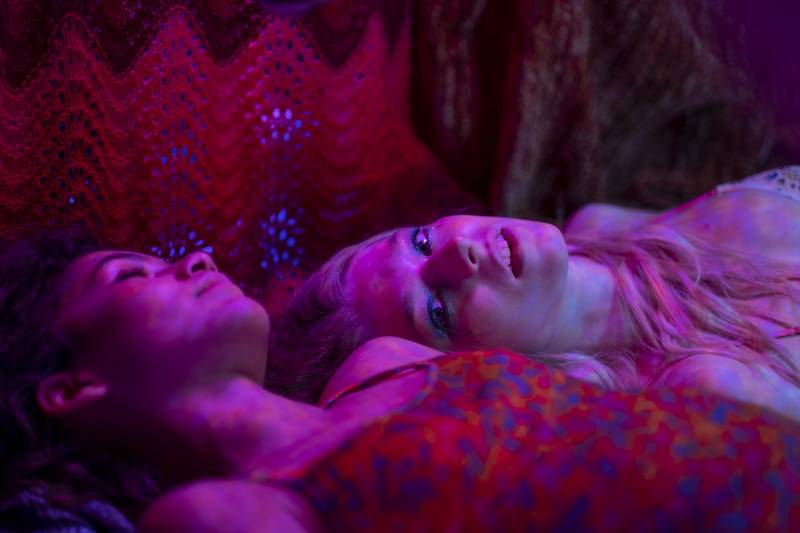When COVID-19 forced HBO’s Euphoria to press pause on filming Season 2, it could have completely scuppered the show’s momentum. Season 1 ultimately succeeded in conveying the trials of Gen Z adolescence, but it also focused a little too much time and energy on proving how dysfunctional its characters were. In the end, Euphoria worked because of the strength and commitment of its supremely talented cast, but it also occasionally got bogged down in its own desire to shock.
HBO’s ‘Euphoria’ Specials Offer Rare Depths About the Lives of Teen Girls

The two special episodes to emerge out of the pandemic—“Rue,” which aired in December, and “Jules,” which started streaming over the weekend—have benefitted from slowing down their focus and allowing the show’s two lead characters to exhale. In taking the time to permit Rue (played by Zendaya) and Jules (Hunter Schafer) to verbalize everything they have going on internally, the show has managed to sharply pinpoint the agony of teenage life in a much more effective way than the first season did.
In Sunday’s hour-long episode, Jules, 17 and trans, is seen in a therapy session. There, she discusses her relationship to men, to Rue—who recently crossed over from best friend to love interest—and to her own body. In Season 1, the agony of teen girlhood was conveyed, by and large, via a variety of characters dealing with physical and emotional exploitations. The girls were subjected to sexual assaults, coercion, pressure to take nude photos, and slut-shaming.
All of those things pose real threats to the lives of teenage girls, of course. But it was in Sunday’s episode that I was most viscerally reminded of the weight and near-constant discomfort inherent in being a teenage girl. Jules, in describing to her therapist why Rue felt so much like home, made a speech that took me right back to high school in a way no other piece of television ever has.
Most girls when you first talk to them, they automatically analyze and compare themselves to you. Then they search for where you fit into their hierarchy and treat you accordingly. Like, how close you are to what they collectively want to be in their heads. And even if they’ve mastered the art of hiding it with smiles and nods and small talk, you still catch them doing it. You know, their eyes wandering over your face, or the quick takes up and down your body. They watch how your clothes hang off your torso, or they look for what tags are on your clothes to see where you shop, or they’ll watch your hands to find fucked up cuticles or chipped nail polish. It would be a sensual experience if it wasn’t so fucking terrifying.
So often television boils down the teen experience to girls being unnecessarily mean to each other. But here, we got much closer to the truth. Girls, under near-constant pressure to be the thinnest, the prettiest, the best dressed, take it out on each other even when they don’t mean to, because of living in a near-constant state of insecurity. Many can’t help but scrutinize others as a means to figure out what they’re doing wrong, or in what way they could be better.
In her special episode, Jules also talks about the realization that her attachment to taking hormones is, in part, rooted in trying to keep her voice high and her body small. And while she’s talking about her experience from a trans perspective, those sentiments ring true for a lot of adolescent girls. Smallness is, Jules believes, “what men want.” In real life, that belief system is one of the reasons puberty is considered a “critical risk period” for eating disorders in girls. I don’t recall ever hearing this discussed on a fictional TV show in a way that didn’t also convey the girl as somehow vain, self-indulgent or self-destructive.
Consistently in the show, Rue has been an example of a girl who has neither the time nor the energy to worry about such things. Instead, she has her grief, depression and addiction to contend with. But her unwillingness to do what is expected of her—her inability to fit in—is one of the things that alienates her from her peers and makes her feel so unlovable. Jules and Rue share deep feelings for each other precisely because they are both so different from the other girls. That’s why they know how to accept each other unconditionally. One scene in which Rue is seen lovingly helping Jules inject her hormones hammers the point home.
When you are an alienated teenager, finding a friend who will love you unconditionally and without judgment can be a literal life-saver. When we saw Rue in her special in December, alienated from Jules, she was once again so untethered, so uncomfortable in her own skin, that she expressed a desire to not “be here anymore.” It reminded me of conversations I had in my teens. Sometimes it was my friends saying it; sometimes it was me. That specific degree of pain—the pain of trying to find your place in a seemingly hostile world—had been wiped from my memory until Euphoria brought it all screaming back.
In these two special episodes, Euphoria elevated its teen characters out of their narrow niches—the drug addict and the desperate-for-love trans girl—and gave them a depth that made them infinitely more relatable for much wider audiences. The specials successfully conveyed the small agonies that are ever-present for so many teenage girls, especially the ones who are a little bit different. And those intense and memorable performances from both Hunter Schafer and Zendaya were cathartic—not just for the teens still going through it, but for the countless adults who already survived it.

